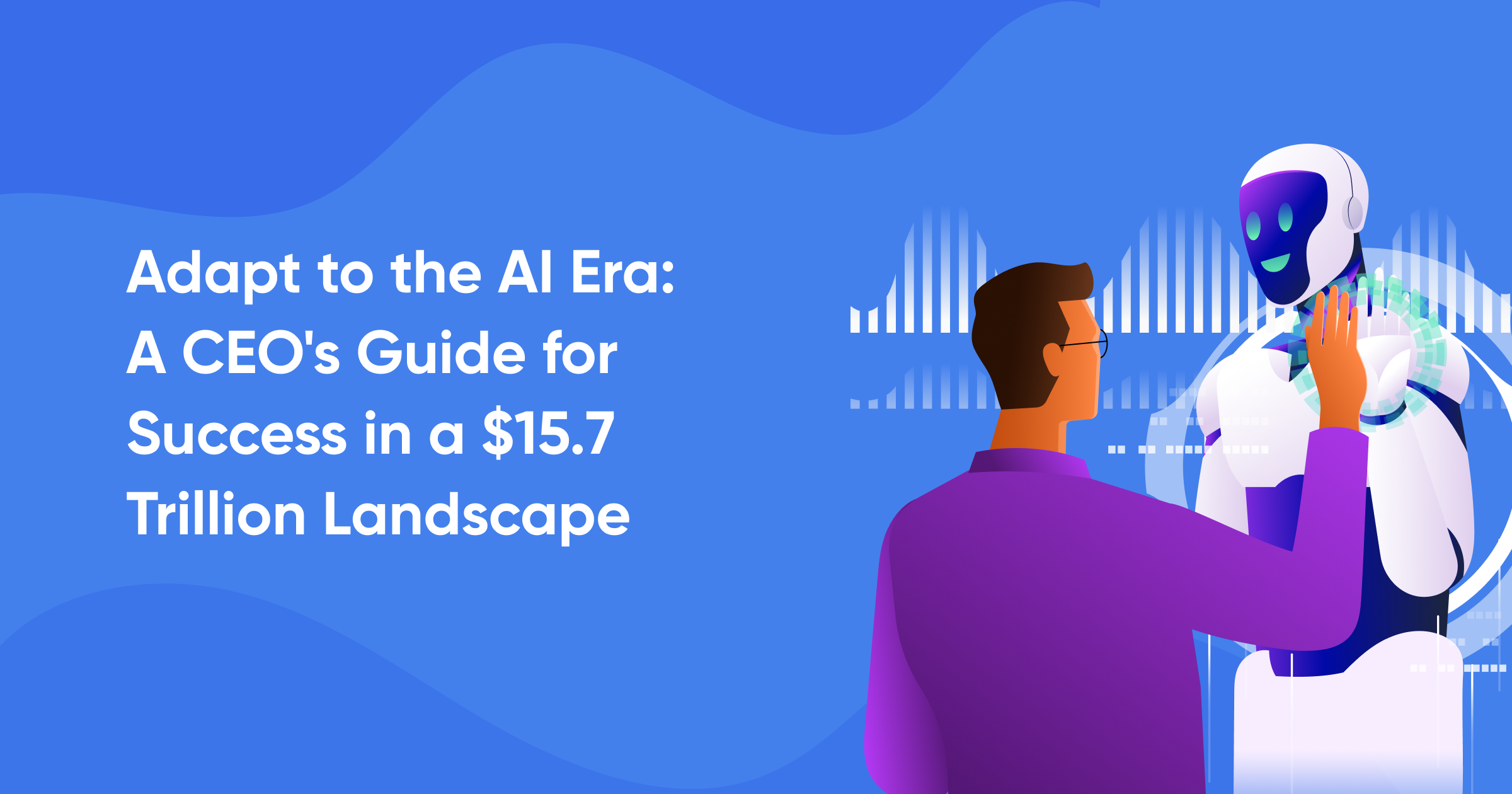Joshua Julien Brouard
29 January 2024 • 6 min read

(What ChatGPT 4 creates when prompted to create an image about the “AI-era.”)
AI's anticipated $15.7 trillion contribution to the global economy by 2030 marks a pivotal era. As AI firmly establishes its presence, adapting becomes imperative.
In this article, we explore this transformative landscape and draw parallels with historical revolutions, contemplating the inevitable shifts in the job market.
The impact of artificial intelligence is substantial — 300 million jobs at risk, echoing historical shifts like the first and second industrial revolutions.
AI is set to automate tasks, reshaping corporate workloads and reducing costs.
Amidst this evolution, we turn to the insights of a seasoned entrepreneur who found a unique path in this changing landscape — Jack Austin, founder of Grassroots Content and co-founder of AI-Informer.

With all this in mind, let's get to the most important question — what is it that we can do to adapt to the AI era and the rise of generative AI tools?
Well Austin has his own story of adaptation in a changing market:
"My history is all in content marketing. I've been in the content marketing game for a very long time, and I've seen things change drastically in that time," Austin begins.
He reminisces about his agency, Grassroots Content, which was thriving pre-AI systems. However, the emergence of ChatGPT posed an unsettling prospect for traditional content creation.
"When ChatGPT first came out, I kind of put my head in the sand a little bit. I looked at ChatGPT, and I thought, these outputs are no good. This is never going to replace humans. Humans are much better than this sort of thing, the usual response," Austin admits.
His initial resistance to the idea that AI could revolutionize content creation was palpable.
Yet, Austin's perspective shifted over time as he delved into experimenting with AI.
"After some time playing with it and experimenting with it, I started to see that this is really going to change the game – not just for content, but for marketing and the world as a whole," he acknowledges.
The realization that AI could be a game-changer fueled his interest in the field.
Explaining his motivation to establish AI Informer, Austin states, "Towards the end of last year, I thought, you know what, I know enough about this now that I can really start sharing with people to help them better tell their stories."
His mission is clear: empower marketing agencies, digital marketing professionals, coaches, consultants, and content creators by leveraging AI capabilities.
"I know from experience that creating a shedload of content every day is a nightmare to keep on top of. If you do AI well, it can do as good a job as you or the copywriters that you're using to produce your content at the moment," Austin affirms.
This realization became the driving force behind the inception of AI Informer.
Interested in how AI might be implemented for the day-to-day business owner, I queried Jack, enquiring whether these tools might be beneficial, and if so, how.
"When I came to develop AI Informer, the entire process involved defining our brand, establishing brand values, crafting messaging, formulating offers, and figuring out how to connect with our customers. It encompassed everything you'd need for starting any business," Austin shares.
However, what sets his approach apart is the reliance on AI to drive these critical aspects.
Austin explains, "I can tell you why I know this. I did it all with AI - all of it. Granted, I had to give it input, but all of my framework templates, branding, goals, branding strategy, customer messaging, ICPs (Ideal Customer Profiles) – all of it was developed by AI."
This bold move to let AI take on the heavy lifting in shaping the foundational elements of AI Informer has proven to be a game-changer.
"I got AI to do all of the heavy lifting, and it is now the basis of the business that I'm running," Austin asserts.
The reliance on AI wasn't just a passive experiment; it became the driving force behind bringing in and converting customers, ensuring they derive value from AI Informer's offerings.
Reflecting on the extensive work invested, Austin acknowledges, "I know that I did all of it, but as basically one man on his own for 40 hours, playing with AI to get it done."
This revelation underscores the transformative potential of AI, not just as a tool but as a collaborator in building and defining the core elements of a thriving business.
The message? Even if you're starting a business with nothing, from the ground up, AI can significantly reduce your workload, optimize your processes, and get everything up and running for you.
(Provided you know how to use it.)
Of course, another pertinent question is, in light of all the future changes with AI — what businesses are "safe" to start?
Austin asserts that traditional online businesses still hold great potential but emphasizes the need for integrating AI aspects from the outset. "When you're setting things up, you want to be thinking about how you can leverage AI to do a lot of those tasks," he advises.
In the current scenario, attempting to establish a call center or assembling a development team for heavy lifting might not be the wisest choice, given the rise of no-code development solutions and increasing automation capabilities.
Having foresight into emerging trends is crucial. Austin suggests, "It's having an eye on what do you think's coming? And how will that affect what's here now?"
This forward-thinking approach involves understanding the impact of AI and automation on various business functions.
While acknowledging the transformative power of AI, Austin highlights that some fundamental aspects of business remain unchanged. "Marketing has not really changed since newspaper adverts in the end of the two centuries ago," he notes.
The principles of effective communication, understanding customer pain points, and designing solutions to meet their needs still stand strong.
Austin's advice for aspiring entrepreneurs is rooted in a balanced perspective. "As long as you've got something that solves a problem, you're relatively passionate about delivering it, and you have one eye on how you can leverage AI and automation, then you can't really go wrong."
The key lies in combining traditional business principles with innovative technologies to enhance efficiency and effectiveness.
Furthermore, Austin emphasizes the importance of a genuine desire to solve problems and provide value. "Your goal should be to help people. And I know that sounds really cliché, but it's true because that's what will lead to money in the long term," he states.
While financial success is undoubtedly a goal, Austin underscores the need for a holistic approach, building an audience, showing authority, and solving real problems as the foundations for sustainable success.
In the AI era, adaptation is the key. With a projected $15.7 trillion impact on the global economy by 2030, AI is more than a trend — it's a transformative force.
As we navigate this wave of change, lessons from past revolutions and insights from entrepreneurs like Jack Austin showcase the power of strategic AI integration.
Whether you're starting anew or reshaping an existing venture, AI isn't the enemy—it's a game-changer.
As human beings, we must embrace innovation, anticipate trends, and strike a balance between tradition and technology.
The future belongs to those who ride the AI wave with confidence, turning challenges into opportunities and steering towards success.
Want to see how Trademarkia “rides the AI wave”? Check out Trademarkia.ai, our take on legal automation.
Embrace a mindset of continuous learning and stay updated on AI trends. Apply critical thinking and integrate AI strategically into your business processes, focusing on tasks that can be automated to enhance efficiency.
Begin by assessing your business needs and identifying tasks suitable for automation. Invest in AI tools and training for your team, fostering a culture of adaptation and innovation. Start small, experimenting with AI applications that align with your goals.
No, it's not too late to get into AI. The AI landscape is evolving, presenting ongoing opportunities for skill development and business integration. Start by building foundational knowledge and progressively explore AI applications relevant to your interests or industry. While you might see the world increasingly dominated by these technologies, you can still adapt and thrive.
Routine and repetitive tasks, such as data entry and basic accounting, are at the forefront of jobs susceptible to artificial intelligence automation. However, higher-skilled roles that uniquely human skills, creativity, complex decision-making, and emotional intelligence are less likely to be immediately replaced.
Professions emphasizing human connection, creativity, and complex problem-solving, like people management, counseling, and strategic planning, are less prone to artificial intelligence takeover. Jobs requiring empathy, interpersonal skills, and a deep understanding of human behavior are likely to remain essential, even in an AI-driven world.
AUTHOR
Joshua J. Brouard has a diverse background. He has studied bachelor of commerce with a major in law, completed SEO and digital marketing certifications, and has years of experience in content marketing. Skilled in a wide range of topics, he's a versatile and knowledgeable writer.
Related Blogs

How to Renew a Trademark: A Guide That M...
17 May 2024 • 5 min read

How to Trademark a Name | Exploring the ...
17 May 2024 • 8 min read
.png%3Falt%3Dmedia%26token%3D61e4c1a1-34ee-427f-8cbe-48da50784682&w=256&q=75)
Will Palworld Get Copyrighted? (+ the Po...
17 May 2024 • 5 min read

7 Tips to Protect Your Business from Bra...
17 May 2024 • 8 min read

Can OpenAI Trademark GPT? (It’s Not That...
17 May 2024 • 3 min read